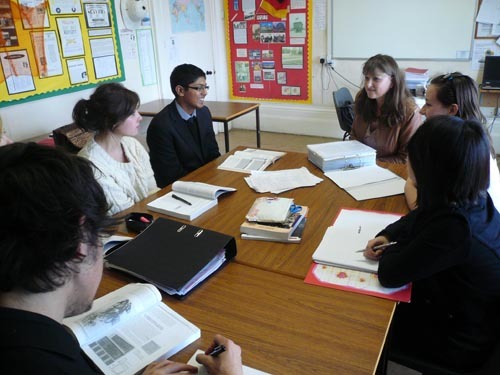
Selon un rapport de l'Alliance pour l'éducation excellente, attrition des enseignants coûte aux États-Unis jusqu'à $2.2 milliards par an. Environ un demi-million Americains. les enseignants déplacer ou quittent la profession chaque année, et tragiquement, ce grave problème affecte de manière disproportionnée les écoles de grande pauvreté.
Il est essentiel que nous gardons tous les enseignants que nous obtenons. Yet classroom teaching is arguably the most stressful job there is. Somewhere between 40 et 50 percent of those that go into teaching are gone within five years. Teachers matter, and if we are to have excellent teachers, we not only have to focus on recruiting qualified candidates but also creating an environment in which they can flourish.
In pursuit of solutions to the problem, La recherche globale pour l'éducation asked our Top Global Teacher Bloggers this month: What are the top ten ways that administrators can help new teachers avoid burning out?
Adam Steiner (steineredtech) discusses in his blog the kind of pressure that teachers feel because of the political pressure put on schools to perform. Improving schools is called the “responsabilité” approach where teachers are held directly responsible for the numerical scores of their students on a single annual test. Adam says, “The relentless drive toward higher test scores has left teachers feeling a palpable pressure to show student progress above all else – and the price that is paid is in student social emotional health and a passion for lifelong learning. Evidence of this over-emphasis on data is in student stress surveys that show that students are overwhelmed with expectations and workload. If students are burned out, their teachers won’t be far behind.” En Savoir Plus.
Pauline Hawkins (PaulineDHawkins) points out that the key to retaining teachers is in the social relations between both the administration and other teachers. New teachers should be paired up with master teachers in a mentor/mentee relationship. New teachers require a whole network of support so that they feel like part of a team. New teachers should be allowed to “concentrate more on building relationships with students rather than on producing flawless curriculum.” Principals should do more than just dole out orders, they should be made to listen to and build rapport with every new teacher. En Savoir Plus.
Expectations should be lined up with experience. Vicki Davis (coolcatteacher) dit, “new teachers are given hard jobs that no one wants. When you give a new teacher too much or too difficult of a task, you’re setting them up for failure.” She points to not only curriculum overload but to the central problem that every first year teacher faces: discipline. Keeping students on track and focused with their work is unlike any job in the world. En Savoir Plus.
Balance is something that new teachers have a hard time finding. Sometimes it can feel like school is their whole world and that can be terribly overwhelming. Craig Kemp (mrkempnz) suggests that teachers must be allowed to have time for self-care. They should still be able to play sports, listen to music, or go running. Craig points to staff drinks and social gatherings as being essential to a healthy education culture. Teachers should be encouraged to associate outside the classroom. En Savoir Plus.
Education has a distinct culture that is different from the rest of the work world. Todd Finley (finleyt) suggests that because of this, “every school has norms of which new faculty might be unaware. Therefore strong mentoring colleagues are critical. A good first meeting would involve discussing a fact sheet of 20 things that might not be obvious to rookies.” Transparency is key for keeping new teachers. A checklist should be made for less visible procedures so that there are no surprises for new teachers. Expectations should be made upfront and totally clear if new teachers are expected to meet them. En Savoir Plus.
Richard Wells (@EduWells) indicates that first year teachers should not be made to bite off more than they can chew. Il dit: “Don’t add to the burden by giving new teachers a wide scope of courses or topics to get to grips with. Keep the initial focus on a narrower curriculum demand. Let them build confidence in a small amount before taking on the full job.” He also points out the double benefit of team-teaching: it relieves some of the pressure put on new teachers as well as provides a time-efficient source of professional development. En Savoir Plus.
La recherche globale pour l'éducation would like to thank our Top Global Teacher Bloggers for sharing their insightful perspectives.
Tom Bennett (@ Tombennett71), Joe Bower (joe_bower), Susan Bowles (FloridaKteacher), Lisa Currie (RippleKindness), Vicki Davis (coolcatteacher), Todd Finley (finleyt), Pauline Hawkins (PaulineDHawkins), Craig Kemp (mrkempnz), Karen Lirenman (KLirenman), Adam Steiner (steineredtech), Silvia Tolisano (langwitches) et Richard Wells (@EduWells) sont La recherche globale pour l'éducation 2014 Haut 12 Enseignant blogueurs mondial. In Memoriam Joe Bower (joe_bower).

Lead photo courtesy of Shutterstock.com
Rejoignez-moi et leaders d'opinion de renommée mondiale dont Sir Michael Barber (Royaume-Uni), Dr. Michael Bloquer (États-Unis), Dr. Leon Botstein (États-Unis), Professeur Clay Christensen (États-Unis), Dr. Linda Darling-Hammond (États-Unis), Dr. MadhavChavan (Inde), Le professeur Michael Fullan (Canada), Professeur Howard Gardner (États-Unis), Professeur Andy Hargreaves (États-Unis), Professeur Yvonne Hellman (Pays-Bas), Professeur Kristin Helstad (Norvège), Jean Hendrickson (États-Unis), Professeur Rose Hipkins (Nouvelle-Zélande), Professeur Cornelia Hoogland (Canada), Honorable Jeff Johnson (Canada), Mme. Chantal Kaufmann (Belgique), Dr. EijaKauppinen (Finlande), Le secrétaire d'Etat TapioKosunen (Finlande), Professor Dominique Lafontaine (Belgique), Professeur Hugh Lauder (Royaume-Uni), Seigneur Ken Macdonald (Royaume-Uni), Professeur Geoff Masters (Australie), Professeur Barry McGaw (Australie), Shiv Nadar (Inde), Professeur R. Natarajan (Inde), Dr. PAK NG (Singapour), Dr. Denise Pape (États-Unis), Sridhar Rajagopalan (Inde), Dr. Diane Ravitch (États-Unis), Richard Wilson Riley (États-Unis), Sir Ken Robinson (Royaume-Uni), Professeur Pasi Sahlberg (Finlande), Professeur Manabu Sato (Japon), Andreas Schleicher (PISA, OCDE), Dr. Anthony Seldon (Royaume-Uni), Dr. David Shaffer (États-Unis), Dr. Kirsten immersive, (Norvège), Chancelier Stephen Spahn (États-Unis), Yves Thézé (LyceeFrancais États-Unis), Professeur Charles Ungerleider (Canada), Professeur Tony Wagner (États-Unis), Sir David Watson (Royaume-Uni), Professeur Dylan Wiliam (Royaume-Uni), Dr. Mark Wormald (Royaume-Uni), Professeur Theo Wubbels (Pays-Bas), Professeur Michael Young (Royaume-Uni), et le professeur Zhang Minxuan (Chine) alors qu'ils explorent les grandes questions d'éducation de l'image que toutes les nations doivent faire face aujourd'hui.
La recherche globale pour l'éducation communautaire page
C. M. Rubin est l'auteur de deux séries en ligne largement lecture pour lequel elle a reçu une 2011 Upton Sinclair prix, “La recherche globale pour l'éducation” et “Comment allons-nous savoir?” Elle est également l'auteur de trois livres à succès, Y compris The Real Alice au pays des merveilles, est l'éditeur de CMRubinWorld, et est une fondation perturbateurs Fellow.
Suivez C. M. Rubin sur Twitter: www.twitter.com/@cmrubinworld






Commentaires récents